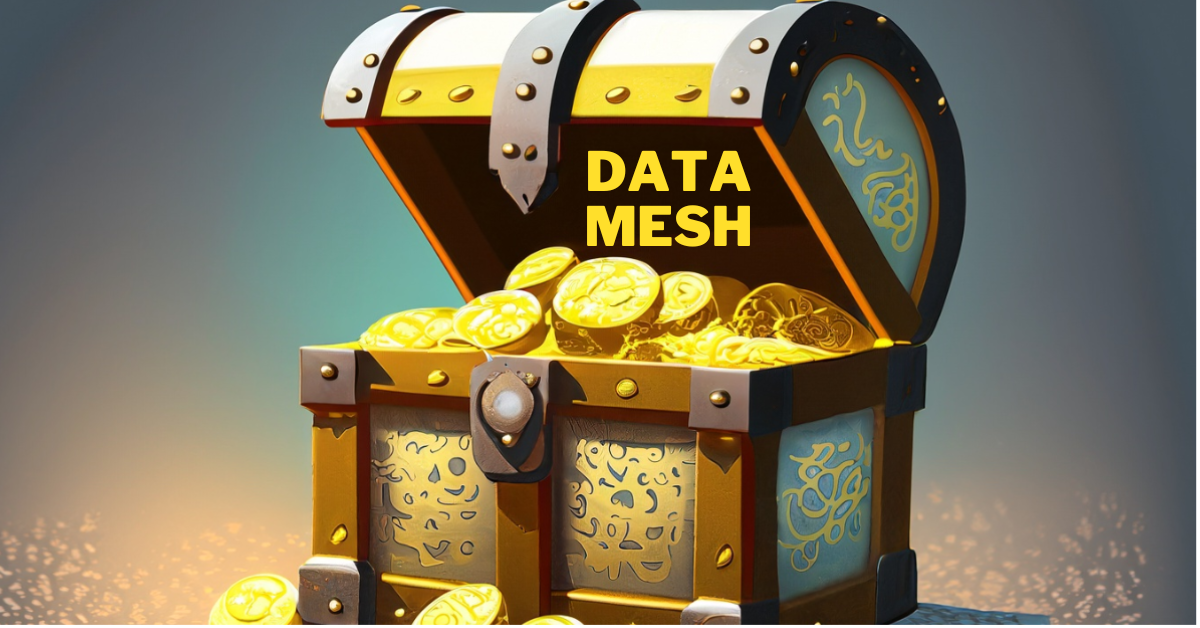Have you found yourself desperately searching for insights and struggling to make sense of it all? Well, fear not, because Data Mesh is the lighthouse to guide you ashore! Let’s dive in and explore a revolutionary approach to managing data that promises to bring order to the chaos and empower organizations to make better data-driven decisions.
—
What exactly is Data Mesh?
Think of it as a paradigm shift in the way we approach data. Traditionally, data has been treated as a centralised resource owned and managed by a select few. But, in a world where data is generated at an unprecedented pace and complexity, this centralised approach falls short. Enter Data Mesh, a decentralised approach that puts data ownership and management in the hands of domain experts.
In a Data Mesh ecosystem, data is no longer locked away in treasure chests guarded by the select few. Instead, it’s treated as a product, with clear ownership, accountability, and governance. Experts, who understand the data and its context, manage their own respective data products. Promotes a sense of ownership and responsibility and fosters a culture of collaboration and knowledge sharing.
—
How does Data Mesh work?
Well, at the heart of Data Mesh is the idea of data domains. Each domain represents a specific area of expertise within an organization, such as sales, marketing, or finance. The domain experts within each domain are responsible for curating, managing, and maintaining their own data products. These data products are self-contained and encapsulate everything needed to derive insights from the data, including documentation, quality measures, and access controls.
To facilitate collaboration and discoverability, Data Mesh relies heavily on the principles of self-serve data infrastructure and data productization. Meaning domain experts have the tools and capabilities to manage their data products independently, without relying on a centralized data team. Data infrastructure is provided as a service, enabling domain experts to focus on deriving value from their data rather than getting caught up in technicalities.
One of the most exciting aspects of Data Mesh is the idea of a federated data mesh. It encourages the formation of cross-functional data product teams that bring together experts from various domains to tackle complex data challenges. These teams collaborate to define common data standards, ensure data quality, and build data products that span multiple domains. This patchwork of expertise and perspectives results in a holistic understanding of the data, discovering new possibilities for insights and innovation.
—
What are the benefits of adopting a Data Mesh approach?
Well, it democratises data and empowers domain experts to make informed decisions based on their unique understanding of the data. It also promotes a culture of data-driven decision-making across the whole organization, as insights become more readily available and accessible. Additionally, Data Mesh increases agility and scalability, as data products can evolve independently, and new products can be created without disrupting the entire ecosystem.
Of course, like all new concepts Data Mesh comes with its challenges. It requires a cultural shift within organizations, where trust, collaboration, and knowledge sharing are paramount. Data Mesh demands investment in building the right infrastructure and ensuring data governance and security measures are in place. It also necessitates a mindset that embraces failure and iteration as the crew explore unchartered waters experimenting and learning from their data products.
But, the potential benefits can be worth it. With Data Mesh, organizations can leverage the collective intelligence of their teams, unlock the hidden potential of their data treasure chests, enabling faster data-driven decision-making. It breaks down the barriers that impede innovation and creates an environment where teams can explore, discover, and derive insights from their data with greater agility.
Data Mesh is still an evolving concept, and its adoption is not without challenges. But it represents a bold and promising vision for the future of data. So, let’s set sail on a new adventure, embrace Data Mesh, and exploring the oceans of possibility on this voyage of discovery!
By Lauren Charlton
—
If you are looking for your next data expert, we know our stuff! Get in touch with PL Talents today.

